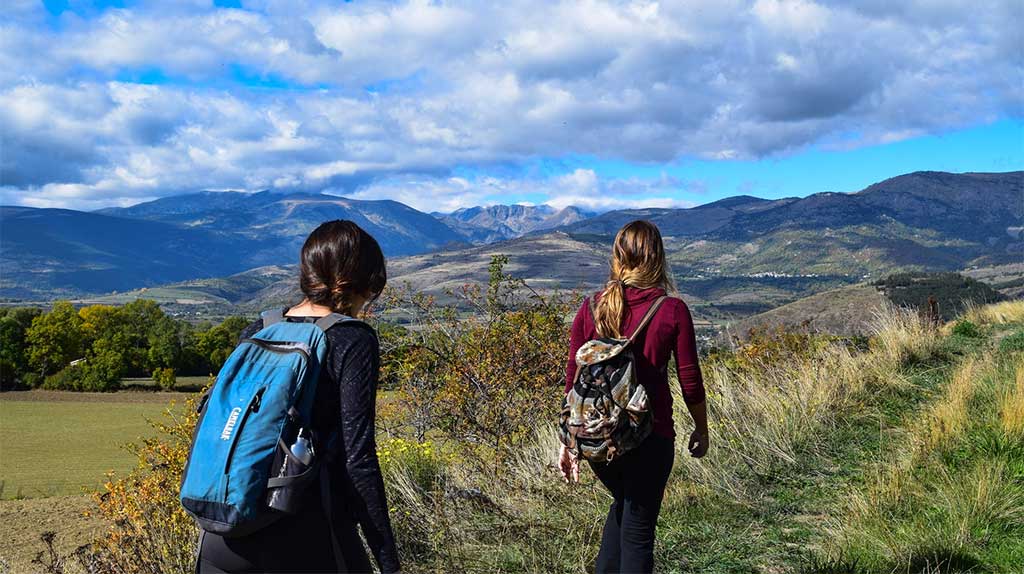Hiking is a wonderful and extremely healthy activity, one that offers an immeasurable number of physical, mental and emotional benefits.
In fact, for some, hiking is much more than a great outdoor activity, it’s a lifestyle.
Although walking around a track or a suburb can offer many health benefits, with hiking those benefits are multiplied exponentially, thanks largely to your surroundings.
In the following article we will list just some of the many benefits of hiking, and explain why you should work hiking into your overall health and fitness plan.
Improves Fitness

Hiking, regardless of whether you are carrying a backpack, a daypack or nothing at all, can greatly improve your fitness level.
According to the National Council of Health, just 60 minutes of moderate hiking can burn up to 500 calories, which can thus help you manage your weight and improve your overall fitness goals.
Walking on asphalt or concrete can be very hard on your joints.
However, hiking trails are typically dirt-based, meaning they are easier on your joints because they have more give—easier on your ankles, knees, feet and even hips.
Hiking in a mountain environment is known to produce a number of fitness-worthy and healthy benefits, including weight loss and lower body strength.
Not only does mountainous hiking help you burn more calories than other workouts would normally burn, it also includes a number of elements that cannot be reproduced with other workouts.
Due to the variation of terrain, the altitude you can most likely expect to experience, and the different speeds and difficulty levels, hiking in the mountains will lead to greater demands on your respiratory system, which translates to improvements in your cardiovascular health, and your levels of endurance, health and fitness.
Hiking Brings Variation to Your Workout
When you choose hiking to be part of your overall workout plan you can really take control of your workout. Instead of the same old treadmill courses, cycling routines, stepper and elliptical workouts, when hiking you can literally chart your own course.
You can change your workout on the fly and switch up trails to give you a more diverse workout, one that continues to shock the muscles for lean growth.
When hiking, you can make your way up a slowly inclining scenic trail, hike a steep trek, and slowly come down the trail, with each path adding a layer of depth and difficulty to your workout.
You can also set your own pace and distance, too.
Whether you decide to power walk or just lazily enjoy all the scenery that hiking has to offer, it is totally up to you.
Your distance can be altered from hike to hike as well, just by lengthening or shortening the “out” path you take.
Regardless if you decide to take a short morning or afternoon hike, an entire weekend in the woods, or a long distance backpacking journey, you will always be the boss of your own path and workout, which is much better than relying on a machine or fitness director for your motivation.
Hiking Tones the Entire Body
When you are in the gym, you probably hit various machines over the course of your workout as you attempt to tone and shape your entire body.
This, as you know, can be a long and arduous process.
These machines, both strength training and cardio machines, can collectively help you tone your body, but with hiking you can get all of these benefits from a single workout.
By taking on steep inclines and declines, using trekking poles to propel you forward, and climbing and clambering over rocks and other obstacles, you are giving yourself a total-body workout that truly gets results.
And if you are carrying a backpack or daypack, your workout will only be that much more intensified.
From a physical standpoint, hiking is known to work almost every muscle in the body, particularly the lower body.
Hiking helps to tone and shape your glutes, quads, calves, hamstrings, and core.
If you are using a backpack you are also getting a great shoulder and back workout, and trekking poles can help increase the strength in your arms and shoulders—the biceps, triceps and deltoid muscles.
Hiking helps to challenge you both physically and mentally—it’s an endurance test that forces you to constantly move as you work every part of your body.
Helps Control or Even Prevent Diabetes
Have you recently been diagnosed with Type 2 Diabetes?
Have you noticed you are starting to get a little round around the middle, with blood sugar levels that have put you in the pre-diabetes phase?
Obesity and lack of exercise are two of the biggest and most prominent precursors for Type 2 diabetes, a condition that can increase your chances for heart disease, stroke and other potentially fatal maladies.
One way to control your blood sugar levels, or at least get them back down into the normal range, is to take up regular hiking.
Consistent hiking, about 3-4 times a week for 45 minutes or more, can help control or even prevent the onset of diabetes.
Hiking helps lower your blood sugar levels and keep them balanced. Hiking is a workout that taxes all of your muscles.
In doing so, this workout helps move glucose out of the bloodstream because the body needs that glucose for energy.
Diabetes is one of the many diseases that can be controlled or prevented from regular exercise, and hiking is one of the best forms of exercise you can do.
Helps Lower Blood Pressure and Cholesterol Levels
Hiking is a great form of cardiovascular exercise.
It raises the heart rate as you trek up and down mountainous terrain, and this, says experts, can help lower your blood pressure when performed on a consistent basis.
Hiking can also help lower bad cholesterol levels, which can help reduce your odds of having a heart attack.
By giving you a total body workout and thus reducing blood pressure and cholesterol, hiking is one of the best preventive measures you can take to lessen the chance for heart disease, stroke, diabetes and even some cancers.
In fact, hiking downhill is two times more effective at removing blood sugars and improving glucose tolerance.
Think about it: just by taking a walk on the mountainous trails you can greatly improve your health and potentially ward off any number of dangerous conditions.
Hiking Has Healing Powers
By now you understand some of the cardiovascular benefits of hiking, but research shows those benefits may extend far beyond lowered blood pressure, cholesterol and more; it may even help some cancer patients recover from their condition.
In a study published by the International Journal of Sports Medicine, researchers discovered that long distance hiking treks may actually improve the anti-oxidative capacity in people, which in turns improves the immune system and helps fight off disease in the blood of oncological (cancer) patients.
Another similar study demonstrated that breast cancer survivors who exercised regularly, many in the form of hiking, believed that the physical activity and serenity they experienced through hiking served as a complement to their recovery from cancer treatment.
Improves Social Interaction
Have you ever heard the phrase “never hike alone?”
If so, you should really take that to heart.
Hiking is a generally safe activity, but if you were to become lost or injured when hiking there could be a delay in getting emergency services if you are all alone and nobody knows where to find you.
Therefore, hikers should always follow the buddy system.
However this buddy system is much more than a mere safety valve, it’s a way to connect with people while exercising and enjoying all the beautiful scenery.
A regular weekend meet-up or a pre-planned long distance hike can help you forge friendships with new participants and connect deeper with those you already know.
In addition, interaction with the larger hiking community encourages you to become engaged with your workout, making it more of a lifestyle choice than a chore.
This, in turn, will most likely turn you into a lifelong hiker that is more likely to stick with the activity for the long term.
Encourages Creativity
Did you know that hiking can make you a more creative person? It’s true.
According to a recent study, researchers found that spending quality time outdoors (hiking) increases your attention span and creative problem-solving skills by as much as 50 percent.
The conductors of this study also reminded us that the results of this study may have as much to do with unplugging from technology as they do with spending time outdoors.
In another study, researchers from the Graduate School of Education at California’s Stanford University found that walking outdoors helps to get the creative juices flowing much more than they would if you were sitting inside.
Helps Fight Depression and Anxiety
Finally, anxiety and depression can be tormenting diseases, leading to a loss of pleasure, irritability, sadness, panic attacks and more.
Fortunately, there is a way to curb the annoying and often debilitating symptoms of anxiety and depression: hiking.
Hiking outdoors requires you to burn physical energy, which in turn signals your body to release more dopamine from the brain—known as the happiness chemical.
Research shows that adding hiking to an overall treatment plan can help people coping with anxiety and severe depression feel less hopeless, depressed and suicidal.
It may even inspire those suffering from these conditions to lead a more active lifestyle.
image: Pexels
